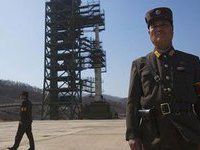
DPRK enters space

The Democratic People's Republic of Korea has successfully launched a satellite into space and congratulates itself on becoming another on the members of the international community pursuing a peaceful space programme. The satellite has entered into its planned orbit.
12.12.12. The DPR Korea caps off the year reversing the failure of April when its space launch failed with a resounding success: the second version of the satellite Kwangmyongsong-3 was successfully launched from the Tongchang-ri launch facility at Sohae Space Center in Cholsan County, North Phyongan Province near the Chinese frontier using the UNHA-3 (Milky Way) rocket.
The satellite was launched in a highly sophisticated three-part multi-stage process at 09.51 KST and an hour and a half later, the Korean Central News Agency reported "the launching of the satellite 'Gwangmyongsong-3' using the "Unha-3" rocket was a success and that the satellite has entered into its planned orbit".
The launch commemorates the one hundredth anniversary of the birth of Kim Il-Sung, the founder of the Democratic People's Republic of Korea and approximately signals the first anniversary of the death of his son Kim Jong-Il, and the father of the current President Kim Jong-un.
The reaction from the international community has been to brand the launch as part of a ballistic missile exercise. Indeed, the North American Aerospace Defense Command stated that "initial indications are that the missile deployed an object that appeared to achieve orbit." A Missile. So when the Americans use the Russian facilities to enter space, they are engaging in ballistic missile technology and using "missiles" to enter space?
Or rockets?
This is the second satellite launch by the DPRK (the first was in 2009). The international reservations are based upon the United Nations Security Council Resolutions 1718 and 1874.
The contents of Resolution 1718 are about nuclear testing (it is difficult to understand how a satellite launch into space can be compared to a nuclear test), stating that the country is forbidden to launch any more ballistic missiles (since when is a space rocket a ballistic missile?) and 1874 demands that the DPRK must not conduct any more missile or nuclear tests.
The definition of a ballistic missile is:
1. a projectile that assumes a free-falling trajectory after an internally guided, self-powered ascent (American heritage Dictionary);
2. a missile guided in the ascent of a high-arch trajectory and freely falling in the descent (Merriam-Webster);
3. a missile with a high, arching trajectory, which is initially powered and guided but falls under gravity on to its target (Oxford English).
What "target" and what "descent? The satellite is in space!
And let us be honest, how can nations which breach the Resolutions of the UNSC then cynically use it as a legal forum and keep a straight face? Russia and China can; the FUKUS Axis cannot.
Timothy Bancroft-Hinchey
Pravda.Ru